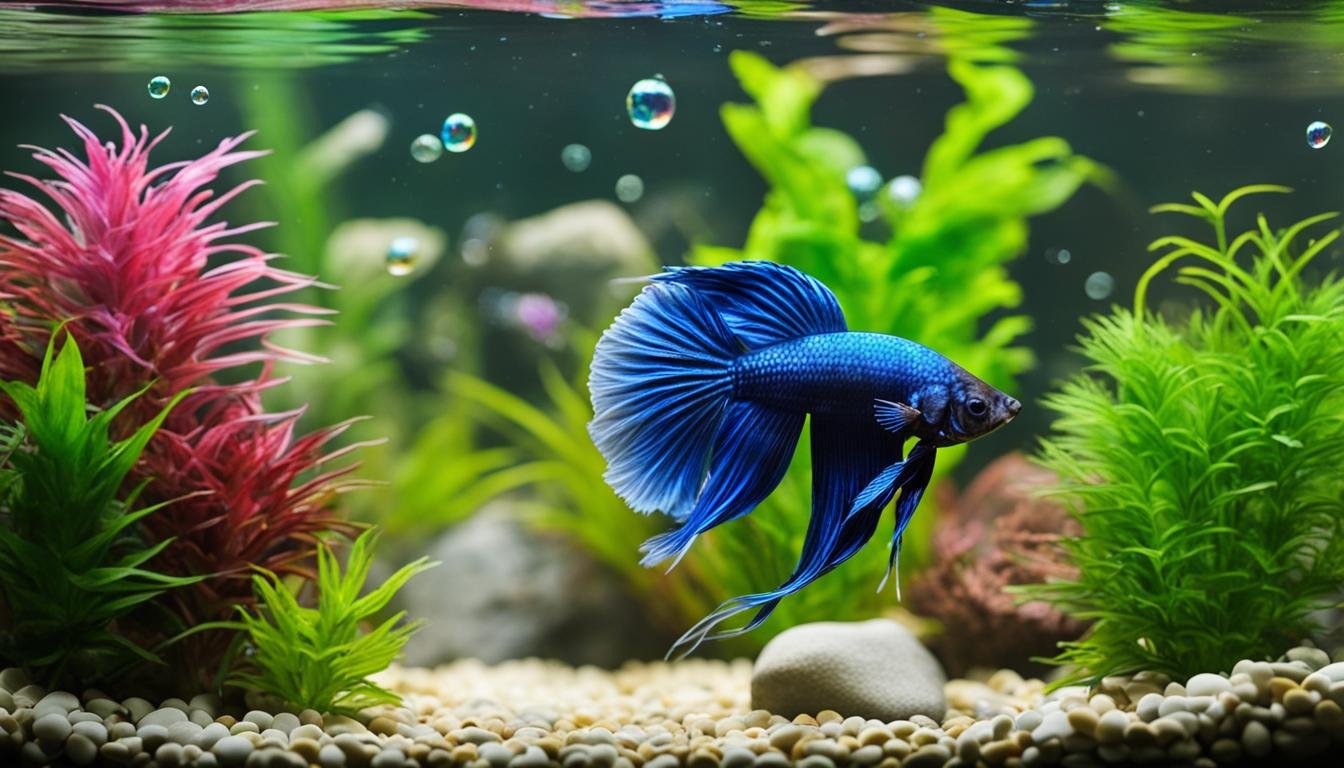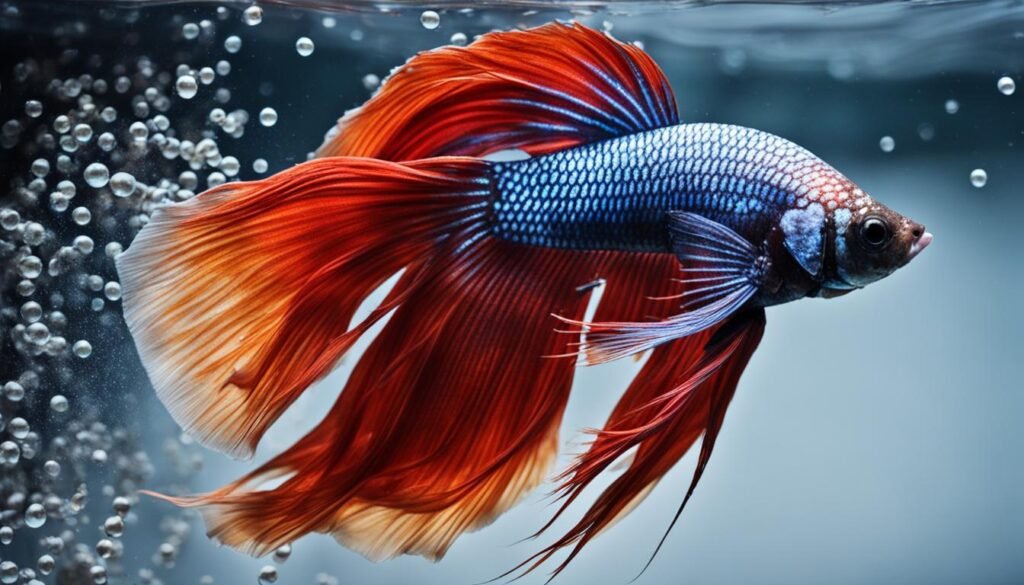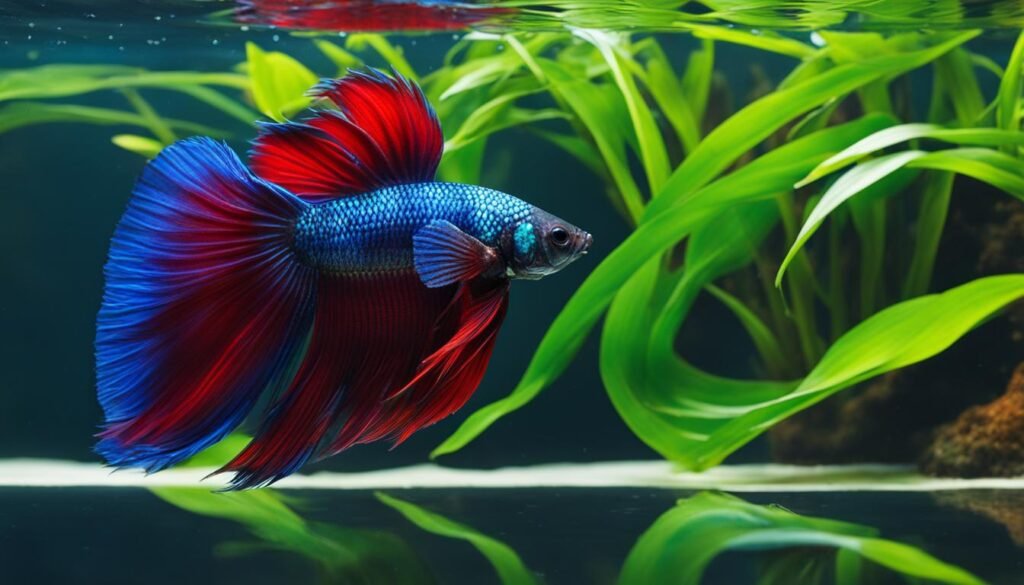Your cart is currently empty!

Are Betta Fish Fresh Or Saltwater? Discover the Answer Here.
Welcome to our article on the water type of betta fish! If you’re considering adding a betta fish to your aquarium, one of the first questions that may come to mind is whether they are freshwater or saltwater fish. In this section, we’ll explore the water type that betta fish thrive in and what you need to know to provide them with the best environment.
Key Takeaways:
- Betta fish are freshwater fish, originating from Southeast Asia.
- They thrive in shallow bodies of water with abundant vegetation.
- Betta fish are highly adaptable to varying water conditions.
- Saltwater environments are not suitable for betta fish.
- Proper care, including feeding and tank maintenance, is essential for their well-being.
Lifespan of Betta Fish: How Long Do They Live?
When deciding to bring a betta fish into your home, it’s important to understand their lifespan. On average, betta fish live between two to five years in captivity. However, with proper care and attention, they can live even longer. In optimal conditions, some bettas have been known to reach five to seven years of age.
So, what factors contribute to the lifespan of a betta fish? One key element is the care it receives. Keeping the tank clean and providing a healthy diet are crucial. Betta fish thrive in a clean and well-maintained environment. Regular water changes and a balanced diet will help ensure their longevity.
Another factor that plays a significant role in a betta fish’s lifespan is genetics. Some bettas are genetically predisposed to live longer, while others may have a shorter lifespan. It’s essential to purchase betta fish from reputable breeders who prioritize the health and longevity of their fish.
Factors Affecting Betta Fish Lifespan:
- Tank cleanliness and water quality
- Diet and nutrition
- Genetics
- Overall health and care
By providing proper care and attention, you can help ensure that your betta fish lives a long and healthy life. Remember to monitor their environment, feed them a balanced diet, and provide the love and care they deserve.
Feeding Betta Fish: How Often and What to Feed Them

Feeding betta fish properly is crucial for their health and well-being. As responsible caretakers, it is important to understand their feeding habits and provide them with a balanced diet. So, how often should you feed your betta fish?
Feeding Frequency
- Feed your betta fish twice a day, in the morning and evening. This regular feeding schedule helps to maintain their metabolism and provides them with the necessary nutrients.
- It is recommended to offer small portions that they can eat within 2-3 minutes. Overfeeding can lead to obesity and health issues, so avoid feeding them more than they can consume.
Dietary Recommendations
- Betta fish are carnivores and thrive on a high-protein diet. Their main food source should be betta fish pellets, which are specifically formulated to meet their nutritional needs.
- Supplement their diet with occasional treats such as freeze-dried or frozen bloodworms, brine shrimp, or daphnia. These provide variety and additional nutrients.
- Avoid feeding them human food, as it can be harmful to their health. Also, refrain from giving them goldfish flakes or tropical fish flakes, as these do not meet their dietary requirements.
Remember to remove any uneaten food from the tank to maintain water quality. Additionally, betta fish are sensitive to changes in water temperature, so ensure that the tank water is kept between 76 to 82 degrees Fahrenheit for optimal digestion and overall well-being.
By following these feeding guidelines and providing your betta fish with a balanced diet, you can help them thrive and live a healthy life. Remember, a well-fed betta fish is a happy fish!
Do Betta Fish Sleep? Exploring the Sleeping Habits of Betta Fish
When it comes to the sleeping habits of betta fish, they may surprise you. While bettas do have periods of rest, they don’t sleep in the same way that mammals do. Unlike humans and other animals, betta fish do not have eyelids, so their eyes remain open even when they are resting. This can make it appear as though they are awake, even though they are taking a break from their usual activity.
During their resting periods, betta fish slow down their activity and metabolism to conserve energy. They may find a comfortable spot in their tank and remain still for extended periods. This restful state allows bettas to recharge and rejuvenate without the need for sleep as mammals experience it. So, while betta fish do rest, they never truly close their eyes or enter a deep sleep state.
The Rest and Activity Cycle of Betta Fish
Betta fish have a natural rest and activity cycle that can vary depending on their environment and individual preferences. Some bettas may have a more nocturnal pattern, while others may be more active during the day. It’s essential to observe and understand your betta’s specific rest and activity habits to ensure their well-being.
- Betta fish rest by slowing down their swimming and conserving energy.
- They may find a spot to rest among plants, rocks, or other decorations in their tank.
- During rest periods, bettas may still respond to external stimuli, such as food or movement near their tank.
- It’s important not to disturb your betta fish during their resting periods, as they need this time to recharge and recover.
So, next time you see your betta fish seemingly wide awake with their eyes open, remember that they are simply taking a break and resting. Understanding the unique sleeping habits of betta fish will help you provide them with the care and environment they need to thrive.
Natural Habitat of Betta Fish and Their Adaptability

When it comes to the natural habitat of Betta fish, these stunning creatures are native to Southeast Asia. They can be found in countries such as Cambodia, Laos, Myanmar, Malaysia, Indonesia, Thailand, and Vietnam. In their native regions, Betta fish inhabit various shallow bodies of water with abundant vegetation, including rice paddies, marshes, floodplains, and paddy fields.
One remarkable aspect of Betta fish is their adaptability to different water conditions. They are known to thrive in environments with low oxygen levels and poor water quality, making them resilient and hardy. This adaptability is one of the reasons why Betta fish are popular among aquarium enthusiasts. They can tolerate a wide range of water parameters, but it is essential to provide them with clean water and maintain suitable temperature levels.
Betta Fish in Southeast Asia
In Southeast Asia, Betta fish hold cultural significance and have been admired for their vibrant colors and unique characteristics for centuries. In countries like Thailand, they are often associated with beauty and good fortune. Betta fish have also been selectively bred over time to create different fin types and color variations.
Today, Betta fish are not only found in their native habitats but are also kept as pets all around the world. Their striking appearance and relatively low maintenance make them popular choices for aquarium enthusiasts and beginners alike. However, it’s important to note that Betta fish are solitary creatures and should be kept alone in their tanks to avoid aggression.
Overall, understanding the natural habitat and adaptability of Betta fish can help us provide them with the proper care they need. While they are indigenous to Southeast Asia, these beautiful fish have captured the hearts of aquarium enthusiasts worldwide, bringing a touch of elegance and tranquility to our homes.
Introduction and Popularity of Betta Fish
Betta fish, also known as Siamese fighting fish, have captivated aquarium enthusiasts worldwide with their vibrant colors and graceful appearance. With their origin tracing back over 1,000 years in Thailand, these beautiful creatures have become increasingly popular as ornamental fish.
Initially bred for their fighting abilities, betta fish have undergone selective breeding over the centuries, resulting in a wide variety of colors and fin shapes. Today, bettas are available in a stunning array of hues, including vibrant blues, fiery reds, opulent purples, and even striking metallic shades.
Due to their stunning appearance and relatively low maintenance needs, betta fish have gained immense popularity as pets. Their small size, typically around 2-3 inches, makes them ideal for smaller aquarium setups. Additionally, bettas have a unique personality, often displaying curious behavior and interacting with their owners.
Conclusion
After exploring the fascinating world of betta fish, we can conclude that these beautiful creatures thrive in freshwater environments. It is vital to provide them with the best water type for their well-being. Keeping betta fish in saltwater is not recommended as it can be harmful to their health.
Caring for betta fish requires attention to their specific needs. Ensuring proper feeding with a high-protein diet, maintaining a clean tank, and providing a suitable temperature range are crucial for their overall care and happiness. Remember, a well-cared-for betta fish can live for several years, bringing beauty and joy to your aquarium.
As beloved pets, betta fish offer a unique and captivating presence. Their vibrant colors and graceful swimming patterns make them a popular choice for aquarium enthusiasts. However, it’s important to note that bettas are best kept alone due to their aggressive behavior. Providing a comfortable and stress-free environment is key to their well-being.
FAQ
Are Betta Fish Fresh Or Saltwater?
Betta fish are freshwater fish.
What is the lifespan of a Betta Fish?
In captivity, betta fish typically live between two to five years, but with proper care, they can live longer. Some betta fish can live between five to seven years in ideal conditions.
How often should I feed my Betta Fish and what should I feed them?
Betta fish should be fed twice a day with a high-protein diet. Fish pellets are often recommended over flakes for betta fish.
Do Betta Fish sleep?
Betta fish do have periods of rest, but they do not sleep in the same way mammals do. They slow down their activity and metabolism to rest, but their eyes remain open.
What is the natural habitat of Betta Fish?
Betta fish are native to Southeast Asia, specifically Cambodia, Laos, Myanmar, Malaysia, Indonesia, Thailand, and Vietnam. They inhabit shallow bodies of water with abundant vegetation.
How were Betta Fish introduced and why are they popular?
Betta fish, scientifically known as Betta splendens, were first domesticated at least 1,000 years ago in Thailand. They have since become popular as ornamental fish worldwide due to their vibrant colors and large, flowing fins.
What is the best care for Betta Fish?
Betta fish thrive in freshwater environments and should not be kept in saltwater. They have specific care requirements, including proper feeding, tank cleanliness, and a suitable temperature range.
Leave a Reply